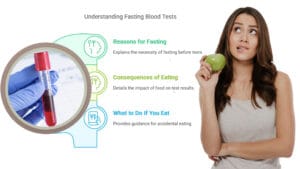What Is Down Syndrome?
Down Syndrome is a rare genetic condition that affects a developing fetus in the womb. In this condition, a person has 47 chromosomes in total instead of the usual 23 pairs of chromosomes. This changes the way a person behaves and performs, and proper management is needed for the same.
What Causes Down Syndrome?
Down Syndrome disease is caused by genes and can affect anyone. It occurs due to a genetic abnormality known as trisomy 21. It occurs when there is an extra copy of chromosome 21, resulting in a total of three copies instead of the usual two. There are no specific reasons behind the causes of Down Syndrome during pregnancy and assess which fetus might develop this condition. It is completely unrelated to the timeline of pregnancy or what the parents did. Down Syndrome affects people randomly and not in an autosomal dominant or recessive manner.
Did you know:
Many people with Down Syndrome are leading healthy successful lives. One need not worry if their child is diagnosed with the condition. There are a lot of support groups to help you in this journey.
How Is Down Syndrome Diagnosed?
Down Syndrome can be diagnosed by the following:
Prenatal Screening Tests
Prenatal screening tests are often used to assess the possibility of your child having Down Syndrome. However, this is not a confirmed diagnosis. These tests include bloodwork or an ultrasound. The blood tests conducted under this are double marker tests in the first trimester. If this test is positive, further testing is conducted.
Diagnostic Tests
Further diagnostic tests like Amniocentesis, Chorionic villus sampling (CVS), and Percutaneous umbilical blood sampling (PUBS) are conducted to confirm the Down Syndrome genetic disorder.
Blood Test After Birth – Karyotype is a blood test used to confirm Down Syndrome in babies after birth. They help detect the presence of the additional chromosome 21 in the baby’s cells.
Physical Examination
Some common physical signs of Down Syndrome during pregnancy include a shirt neck, flat nose, slanted eyes, small ears, hands, and feet, and a weak muscle tone at birth. These symptoms become more apparent as the baby grows older.
Types Of Down Syndrome
Down Syndrome disease can be of three types:
- Trisomy 21 – This is the most common type of Down Syndrome and accounts for almost 95 percent of cases. Under this condition, each cell has a separate chromosome 21 in addition to the typical two copies.
- Translocation Down Syndrome – This condition accounts for 4 percent of cases, each cell has an additional chromosome 21, but they are not separate. The chromosome is attached to one of the copies.
- Mosaicism – This type of Down syndrome accounts for 1 percent of all cases and is highly rare. In this condition, only a few cells have the additional chromosome 21.
Did you know:
People with Down Syndrome are more susceptible to developing Alzheimer’s in their later years. They are also prone to have Autism, a rare developmental disorder that challenges basic social skills.
Signs And Symptoms Of Down Syndrome
People with Down Syndrome display different signs and symptoms which develop over time. However, not all people present themselves with the symptoms. The following are the major Down Syndrome symptoms:
- Physical signs such as a flat nose bridge, slanted eyes, small ears, hands, and feet, weak muscle tone, and shorter height, are evident in most people.
- Additional conditions include hearing loss, vision problems, prone to infections, congenital heart diseases, and sleep apnea.
- Cognitive symptoms include poor motor skills, language development skills, social skills, and emotional skills. It also affects their learning ability to some extent.
- Behavioral symptoms include obsessive or compulsive behavior, stubbornness, and lack of attention.
Other Medical Conditions Associated with Down Syndrome
Understanding the medical conditions associated with Down syndrome is essential for individuals with Down syndrome and their caregivers. Common conditions of Down syndrome can include:
Heart issues: About 50% of infants with Down syndrome have congenital heart anomalies, which may call for treatment or continued observation.
Thyroid abnormalities: People with Down syndrome are more likely to have hypothyroidism, an underactive thyroid, which calls for regular monitoring and possible hormone replacement medication.
Gastrointestinal problems: Constipation, gastric reflux, and celiac disease are examples of conditions that can affect people with Down syndrome and necessitate dietary modifications and medical treatment.
Autism Spectrum Disorder (ASD): People with Down syndrome have a higher chance of co-occurring ASD, needing early detection, intervention through therapies, and specialized support.
Alzheimer’s disease: People with Down syndrome are more likely to get Alzheimer’s disease, thus regular cognitive evaluations and the right kind of care are crucial for managing this condition.
Management of Down Syndrome
The risk of Down Syndrome is that it severely affects the lifestyle of a person and makes it difficult to carry out basic life skills. The effects of Down Syndrome can lead to social withdrawal and eventually depression. Since there is no known treatment for this condition, it is best to try and manage Down Syndrome treatment through the proper channels:
- Opt for physical therapy, speech therapy, and occupational therapy to help your child develop their cognitive abilities and achieve their full potential.
- Join special educational programs specialized in managing such conditions.
- Educate yourself in the skills required to properly manage kids with Down Syndrome.
- Treat associated medical conditions regularly.
Sources
Ref Links:
- https://my.clevelandclinic.org/health/diseases/17818-down-syndrome
- https://www.ncbi.nlm.nih.gov/books/NBK526016/








